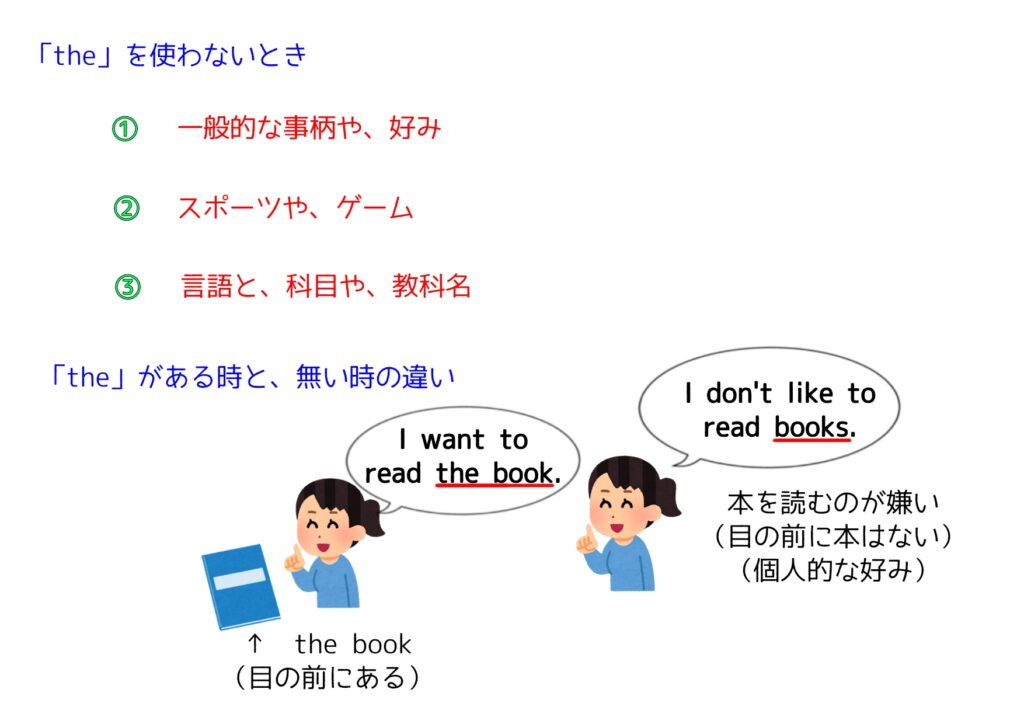第47回:冠詞をどのように使うのか。細かいルール。その③

the を使ったり、使わなかったりすることで、どのような意味の違いが生まれるのでしょうか。
Q. この記事で、一番大事なことって何?
A. 大事なことを、1枚の画像にまとめました。

いちいちノートにまとめるのが面倒だという方、また、
ノートにまとめることが苦手だという方は、ご活用ください。

[広告]
確かな英語力は、日々の継続から。
その継続を後押しする、第二言語習得理論に基づいた
オンライン英語学習プログラムがあります。
英語を使う人のための、確実なスキルアップが望める
7日間の無料体験はこちらから!
定冠詞「the」、不定冠詞「a/an」の使い分け、そして冠詞を使わない時とは
- 複数形や不可算名詞について、一般的な話をする場合には冠詞を使いません。具体的な人や物を指定する場合には「the」を使用します。
- 祝日や一年の特別な時期、月や曜日については、一般的に冠詞を使いません。
- 時間については、真夜中、正午、昼などには冠詞を使用しませんが、「夜明け」については「the」を使う場合もあります。また、日中の時間帯については、一般的に「the」を使用します。
- 交通手段やコミュニケーション手段については、「by」に続けて冠詞を使用しないことが多いです。
文章を正確に理解するためには、冠詞も文脈によって使い分けが異なることを理解することが重要です。また、ルールに従って使い分けることも大切ですが、慣用表現やニュアンスを理解することも重要です。
具体例
- Zero article with plural and uncountable nouns:
- Books are a great source of knowledge. (talking generally about books)
- The books on the top shelf are mine. (referring to specific books)
- Music can soothe the soul. (talking generally about music)
- The music playing on the radio is my favorite. (referring to a specific music)
- Zero article with names of holidays, special times of the year, months, and days of the week:
- Easter is a time for reflection and renewal. (talking generally about Easter)
- I’ll see you on Tuesday. (referring to a specific day of the week)
- We always have a big family gathering on Christmas Day. (referring to a specific holiday)
- I’m going on vacation in the summer. (talking generally about the season)
- Zero article with times of the day and night:
- I usually wake up at dawn. (talking generally about the time of day)
- He got back into bed and waited for dawn. (referring to a specific time of day)
- I want this project finished by midnight. (referring to a specific time of night)
- Morning is my favorite time of day. (talking generally about the time of day)
- By + zero article to talk about means of transport and communication:
- I usually travel by train to visit my parents. (talking generally about means of transport)
- I contacted her by email to let her know about the change in plans. (talking generally about means of communication)
- He always goes to work by car. (referring to a specific means of transport)
- I prefer to travel by air when going on long trips. (referring to a specific means of transport)
[広告]
TOEICのスコアを上げたいけれど、
まとまった勉強時間が取れなくて困っている…
なら、細かいスキマの時間を使いながら、
少しずつスキルを積み重ねてみてはどうでしょう。
スマホ1つでスコアアップが出来る、
オンライン講座のリンクはこちらから。
Q. この文法はどうやって使うのでしょうか?
A. 今回の文法を活用した会話文を見てみましょう。

What did you do this weekend?
(この週末は何してたの?)

I went to the beach. The weather was perfect for swimming.
(ビーチに行ったよ。泳ぐのにぴったりの天気だった。)

Oh, that sounds nice. Did you go alone?
(いいなぁ。一人で行ったの?)

No, I went with a group of friends. We had a great time playing beach volleyball and having a picnic on the sand.
(いや、友達と一緒に行ったよ。ビーチバレーしたり、砂浜でピクニックしたり、とても楽しかったよ。)

Sounds like a fun day. What time did you get there?
(楽しい一日だったんじゃない?何時頃着いたの?)

We arrived at around midday and stayed until the early evening.
(だいたい正午に着いて、夕方くらいまでいたかなぁ。)

Nice. How did you get there?
(最高じゃん。どうやって行ったの?)

We took the train to the nearest station and then walked to the beach. It’s much easier than driving and finding parking.
(最寄りの駅まで電車で行って、そこから歩いてビーチに向かったよ。車で行くよりも簡単だし、駐車場を探す手間も省けたからね。)

That’s a good idea. I usually go by car, but the traffic can be terrible on weekends.
(いいアイデアだね。私は普通車で行くけど、週末は渋滞がひどいんだよね。)
[広告]
ロゼッタストーン・ラーニングセンターで、最先端の教育制度を活用して英語を学びませんか?私たちは個々の学習ペースに合わせてeラーニングと対面教育を組み合わせ、柔軟な学習環境を提供しています。自宅でのeラーニングと対面教育のメリットを最大限に活かし、あなたの英語学習をサポートします。最新のテクノロジーと個別の指導が組み合わさった当センターで、自由な学習スタイルを体験してみませんか?英語学習を楽しく効果的に進めるための環境がここにあります。新たな一歩を踏み出して、新しい英語学習の旅に参加しましょう!
Q. この記事の要点は?
A. 冠詞の使い分け。冠詞を使わない時に焦点を当てました。
- 複数形や不可算名詞に対して、具体的な人や物を考えずに一般的に話す場合には、冠詞が使われません。
- 「the」は、聞き手や読者が何を指しているか理解できる場合や、言葉の中の他の部分が具体的な場合に使用されます。
- 祝日や年中行事、月、曜日には冠詞が使われませんが、特定の日や時間を指定する場合には「the」が使われます。
- 時間帯については冠詞が使われることはなく、特に「dawn」については「the」が使われることもあります。
- 交通手段やコミュニケーション手段については、「by」の後に冠詞を使わずに話すことがよくあります。
英会話を始めてみたいけれど、どのサービスが良いか分からない…
そんな方は、まず、この記事で3つのサービスを比べてみてはいかがでしょうか?
英語力を効率良く伸ばすことができるサービス3選です。
次回の文法解説は?
「some」と「any」に関して。
この記事を作る際に参考にした文法の解説書になります。
すべて英語で書かれていますが、練習問題が付いてます。
イギリス英語なので、スペル等の表記が異なる部分もありますが、
「使い方を練習したい」「繰り返し問題を解きたい」
という方は、使ってみても良いかもしれません。
関連記事一覧






-320x180.jpg)












コメント